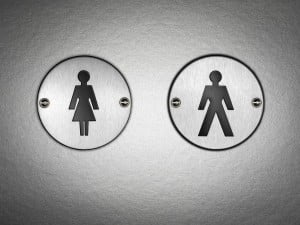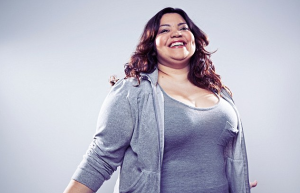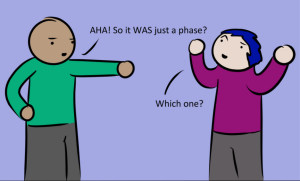
Source: Huffington Post
Originally published on The Body is Not an Apology and republished here with their permission.
Hey, fellow folks with thin privilege (you should know who you are):
We need to talk. I’ve been seeing a lot of people equating skinny-shaming and fat-shaming – and I want to declare, on the record, that this is wrong and harmful.
There is a huge difference between skinny shaming and fat shaming – and it’s a difference of scale and systemic power dynamics. Body shaming against all bodies is damaging, including microaggressions against skinny people.
However, the difference between feelings being hurt and discrimination, dehumanization, and denial of rights on a systemic level is vast.
Body terrorism against people who are fat is insidious, and it’s openly practiced in the halls of our society’s most central institutions — hospitals, schools, the legal system, and the workplace.
Various studies have found that fat people suffer profound discrimination at work; they are more likely to be fired or suspended, less likely to be hired in the first place, earn smaller salaries in comparable positions, and receive fewer promotions for comparable job performance.
In another study, 54% of doctors reported that they believe physicians should have the right to withhold treatment from “overweight” or “obese” patients.
You read that horrifying sentence correctly: Of these professionals who have taken an oath to heal, more than half think that it’s perfectly all right to deny healthcare to people seeking healthcare!
These injustices stem from conscious and unconscious bias against heavier folks. Thinness is not only the beauty standard, but also a false gauge of health, wellness, energy, cleanliness, ambition, intelligence, and morality.
A study from the University of Alberta showed that “when a thin person is seen lying down watching television, people assume they’re resting. But when people see an overweight person relaxing, it’s automatically assumed they’re lazy and unmotivated.”
Yet, clearly, this is not the case.
So, what is thin privilege?
It is the fact that strangers at grocery stores and restaurants have never felt the need to comment on my shopping cart or the amount of food on my plate.
It is the fact that I can find clothes in my size anywhere and everywhere.
It is the fact that no doctor has ever looked at me and thought “diabetes,” “high blood pressure,” or “high cholesterol.”
In fact, multiple doctors have looked at me and said, “You must work out!” even though I do not.
I do not think twice about eating in public. There is no systemic belief about my personality or drive.
If you are a thin person reading this and you feel offended, you might be centering your feelings. I understand that we as thin people experience shaming as well.
Yes, I have felt disgust and discomfort with my body. I have been self-conscious and self-deprecating. I have looked in the mirror and winced at what I saw.
I have heard snide remarks from people who think that they have the right to advise me to gain weight.
I have heard rude quips from people who think that it’s acceptable to say, “You should eat more; you can use a few extra pounds” when I say I’m full from a meal.
Yes, I wholly understand the frustration and irritation of body shaming comments like “Go eat a burger,” and I absolutely believe that campaigns like “Real women have curves” are problematic.
These things are body terrorism, too. However, it is a fact that skinny people are not dealing with prejudice at the same level.
So, if you are someone with thin privilege, and you are committed to fighting body terrorism and fat discrimination, what can you do?
1. Educate Yourself About Health
Modern classifications of “overweight” (over what weight?) and “obese” are derived from the Body Mass Index (BMI) Scale.
The BMI scale is inaccurate, misleading, and contains multitudes of limitations and shortcomings.
Studies conducted by researchers for The British Medical Journal have found that “the determination of the categories of normal, overweight, and obese is entirely arbitrary and at odds with the underlying evidence about the association between body mass index and mortality, a fact that destroys the index’s scientific pretensions and diagnostic value.”
Physical activity and nutrition do positively affect good health – but body weight does not!
You cannot tell how much someone exercises or how nutritiously someone eats by their body size. Remember that you cannot make any assumptions about anyone’s health or lifestyle by looking at them.
2. Reassess Your Intentions
So, you can’t make assumptions about people – but even if someone were unhealthy, why is it your business anyways?
It is not true that weight is an indicator of health or that obesity is an “epidemic” that needs a “cure.” However, even if it were true, fat people still deserve to be treated like human beings.
People who fat-shame very often defend themselves by saying that they have the best intentions. They just want to help. They care about healthy lifestyles and the well-being of others.
But think about this for a moment: If you really, truly wanted to help someone make a healthy lifestyle choice, do you really, truly believe that shaming them and dehumanizing them will work?
Get off your high horse. Someone else’s body, even someone else’s health, is never your concern!
You have no right to shame them. You don’t get to define their value.
Ever.
3. Call Out Concern Trolling
Concern trolling is fat-shaming commentary poorly disguised as good intentions. Some examples:
- “I’m just concerned about your health!”
- “You would be so pretty if you just lost a few pounds.”
- “For your own good!”
- “Obesity is a huge issue in our community/society, and I think it’s important to address it.”
- “I don’t hate fat people, but…”
- “I’m with you, but…”
- Or any comment that hinges on a “but.”
These comments are not only unhelpful, but quite harmful.
If you hear someone trying to concern troll, intervene where you can. Ask them if it’s any of their business, and ask them why they are being so rude and narrow-minded.
Throw out some health facts that complicate the picture because human health is complex and never binary.
Let them know, especially if they are someone close to you, that what they’re saying is oppressive.
4. Understand the Intersections
A white cis heterosexual man who is fat has a very different life experience than fat people with other marginalized identities.
Fatness is stigmatized on all bodies – but on certain bodies, it adds a greater burden.
Furthermore, people who struggle with eating disorders may feel that the words “thin privilege” are galling because it is not a privilege to experience marginalization and ableism from an eating disorder.
This is where we must again remember that oppressions are intersectional.
Privilege in one form does not cancel out oppression in another form. Oppression in one form does not cancel out privilege in another form.
5. And Most of All: Humanize
It all comes down to this: How do you think we, as human beings, should treat one another?
Do you think that arbitrary definitions of health or misconceptions about where our tax dollars go are more important than someone’s humanity?
Do you think that a privileged person’s biases trump an marginalized person’s humanity?
We should always treat one another with empathy, compassion, and respect.
[do_widget id=”text-101″]
Julie Feng is a writer and educator who is committed to intersectional social justice work. She is the recipient of the Academy of American Poets Award, the Joan Grayston Poetry Prize, and the Arthur Oberg Prize for Poetry. Her poems have appeared in Pacifica Literary Journal, Mare Nostrum, A River & Sound Review, Quaint Magazine, and more. She is from Taiwan, based in Seattle, and currently living and teaching in Morocco.
Search our 3000+ articles!
Read our articles about:
Our online racial justice training
Used by hundreds of universities, non-profits, and businesses.
Click to learn more




















